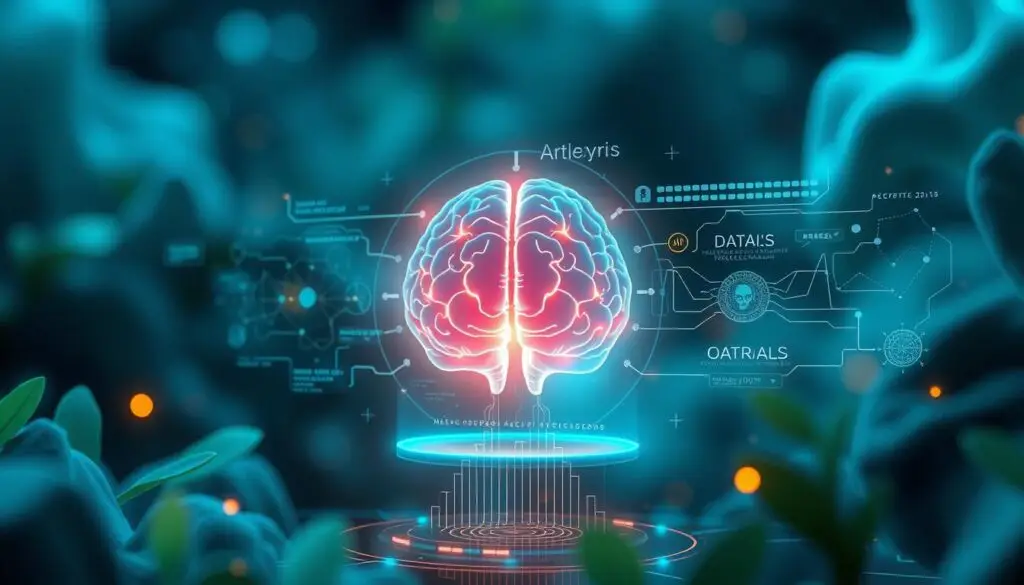In these times, mental health issues are getting worse. Could blending AI with Mental Health be the answer we’re looking for? The number of people diagnosed with mental disorders has shot up by 48% from 1990 to 20191. This makes the role of AI in Mental Health Care even more important. AI has already shown it can be more accurate than doctors in spotting diseases like skin cancer and diabetic retinopathy1. Now, it could also help in ongoing care and management of health.
Picture a future where Digital Health reaches beyond usual limits. It could make mental health care easy to get for those in low-income areas or marginalised communities. Especially in places like England and the US1, where getting these services can be hard. This is more than just a dream. With over 10% of people worldwide having mental health disorders2, finding solutions that work well and don’t cost too much is critical. This comes at a time when the economic cost of poor mental health might reach a shocking $6 trillion by 20301.
So, why is AI seen as a key player in this struggle? AI-driven virtual therapists are already making a difference by lessening mental health symptoms. And digital mental health tools have helped reduce sick days by up to 31%2. AI can also make care more personal, meeting the unique needs of each person. Its smart algorithms are good at spotting mental illnesses with 63-92% accuracy, based on how it’s trained and the data it learns from2.
As the UK faces worsening mental health issues, due in part to the pandemic, taking a closer look at AI is both timely and essential. We’re seeing more anxiety, depression, and even health workers are getting burnt out at 61%3. But as we dive into this world of possibilities, we have to be careful. We must consider the ethical aspects of using AI in mental health3. We also need to make sure that we don’t lose the human touch in therapy. This is how we can find the right balance between new technology and true compassion. As we move forward, we aim for a future where mental wellbeing is supported by AI.
Understanding the Current Mental Health Crisis
Depression is now the main cause of disability worldwide. It costs the UK £117.9 billion a year, which is 5% of the country’s GDP4. This issue puts a lot of pressure on healthcare, especially in places with fewer mental health professionals.
Over half the world lives where there’s less than one psychiatrist per 250,000 people. This makes the mental health crisis even worse4.
The Growing Burden of Mental Disorders Globally
AI technology is being used to predict and treat mental health issues very accurately. This shows how AI could change the way we address mental health globally5.
Challenges faced by Health Systems in Addressing Mental Health Needs
Healthcare systems are struggling with not enough staff and the need to use new technology for mental health support. AI offers a way to help by making care more available through programs like Wysa4. But, it’s important to make sure AI is fair and without bias. This is key to keeping trust in AI’s role in mental health care5.
AI and Mental Health: An Overview of Potential Benefits
For startups, platforms like Character.ai are revolutionising mental health resources, highlighting the key role of good mental health for business success. Personalised AI support can really boost productivity and coping skills, keeping up with the fast business world6.
Healthcare experts working with AI are making diagnoses more precise and finding better ways to manage and treat mental health6. This partnership is crucial for creating a sustainable and effective mental health care plan.
Virtual Therapists: Providing Accessible Care
The rise of virtual therapists is a big step in mental health care. It combines tech with healing methods for easy and effective service. Using AI, these therapists break down the usual hurdles in getting mental health help.
Chatbot Therapies and Patient Experiences
With AI, chatbot counselors like Woebot and Wysa offer real-time chats that feel like talking to a human8. They use emotional AI to truly understand and respond to people’s feelings8. Available anytime, they offer instant support while keeping users anonymous, which helps reduce mental health stigma8.
Overcoming Accessibility Barriers with AI Assistance
AI chatbots break down walls by being available everywhere, regardless of location or cost. They use smart algorithms to make therapy chats more helpful8. The innovations by Woebot Health, like mood tracking, also support kids and teens9. This makes sure mental health support is fair and reaches even the least served areas.
Research shows that these AI chatbots, using therapy methods, are good at lowering anxiety and depression10. As technology gets better, mental health care will become even more personalized and widely available.
The Role of AI in Mood Tracking and Emotional Recognition
New tech in mood tracking and emotional recognition is changing the way we look after mental health. It uses AI to make care more specific to each person. Biobeat’s smart tech monitors mood changes and mental states by analysing biometric data. This helps the medical staff know when to step in1112. The growing use of AI in this field shows how important it is in solving mental health problems11.
AI can also spot human emotions very accurately, sometimes even better than people can12. This helps keep track of moods more carefully, allowing for a deeper look into someone’s feelings and thoughts as they happen12. Additionally, as AI gets better at analysing behaviour, it does more than diagnose. It helps create treatments tailored to what the data predicts about future behaviour and needs1113.
Using AI each day in mental health care improves monitoring and analysing mood swings. It also looks deeper into behavioural changes, spotting early signs of trouble13. This is key because emotional issues like anxiety and depression often occur together. They need a detailed approach to treatment11.
By adding AI to mood tracking and emotional recognition, we’re not losing the human touch in care. Instead, we’re making it better. It allows for quick, tailored actions. This revolutionises mental health care, changing data into real help with more kindness and effectiveness.
Behavioural Analysis through AI: Fine-Tuning Mental Health Care
AI is changing how we look after mental health, thanks to its ability to analyse behaviour deeply. It’s making diagnosing more accurate and care more personalised. With the help of machine learning, health experts can now spot mental health issues earlier. This lets them step in sooner.
By looking closely at how people behave, AI helps match the right support to each person’s needs. This is key to managing mental health well. Machine learning digs into big amounts of data to do this. It’s all about getting the right help at the right time.
Improving Diagnostics with Machine Learning Models
Research from places like IBM and the University of California shows how vital machine learning is in health. It’s super good at going through lots of patient data. This way, it catches early signs of mental troubles14. Catching issues early means treatment can start sooner, which can really change how well someone recovers.
These models also make use of health records and analytics14. As a result, doctors can create care plans that fit perfectly with what each patient needs. It’s all about treating people as individuals, not just numbers.

Natural Language Processing in Understanding Patient Narratives
Natural Language Processing (NLP) offers a special way to care for patients by understanding their stories15. It looks at health records and other texts to get the full picture. In therapy, knowing the small details can really help.
NLP spots patterns that show different health issues, like memory problems or signs of neglect in kids15. This means therapy can be much more focused and helpful. It’s about finding the best way to support each patient’s journey.
With AI’s help, spotting mental health issues and creating care plans gets more precise. It’s making mental health care easier to get and better overall. As AI grows, it’ll keep bringing new ways to understand and treat mental health globally. This is a big step forward in caring for our mental well-being.
Telehealth Integration: Expanding the Reach of Mental Health Services
Telehealth services have changed how we access mental health care. They use technology to overcome barriers like travel and time16. AI platforms let patients get timely care no matter where they are. This makes mental health services available to everyone and provides help without the limits of location17.
You may find interesting: Mental Health First Aid Training for Entrepreneurs
Making Mental Health Care More Inclusive
Telehealth has played a key role in making mental health care more inclusive. It brings services to people in far places or those who find it hard to move. Now, everyone can get the help they need16. The use of AI allows for treatments that perfectly fit each person. This makes telehealth even more effective17.
Enhancing Patient Support with AI-Powered Platforms
AI enhances how patients are supported. It’s not just about therapy anymore. Machine learning and data ideas help make care that changes as patient needs do1817. This tech also makes things easier for healthcare workers. It does routine jobs for them, so they have more time for caring for patients17. As a result, patients are happier and stick to their treatments better, leading to better health16.
AI Counselling: A New Horizon for Mental Health Professionals
In today’s world, digital tools are key to healthcare, and AI Counselling is at the forefront. It enhances traditional methods and opens new paths for treating patients. Tools like Woebot and Tess provide emotional support, showing how AI can change mental health care.
AI tackles big challenges in mental health. It offers round-the-clock support, crucial since half of Americans could face depression. Many don’t get diagnosed19. AI chatbots help people who hesitate to seek help and offer ongoing support, lightening public health duties.
AI does more than keep patients involved; it widens the scope of mental health therapies. It can spot early signs of anxiety and depression by analyzing data, including how we speak and behave19. This forward-thinking strategy betters early diagnosis and tailors treatment plans through learning.
Yet, using digital therapists in mental health has its ethical and practical issues. It could make healthcare inequities worse, as not everyone can access AI tools. Also, too much AI could reduce human contact, vital for a strong therapeutic bond.
To handle these concerns, mental health experts must lead in using AI. Keeping them as a support to human skills is key to effective and ethical treatments20. By carefully blending AI, mental health care becomes more reachable and impactful, enhancing public health.
The future of AI Counselling is vast and full of promise. It could reshape how we view mental health care, creating stronger support systems for all patients. As professionals dive into these digital possibilities, their aim to provide caring, effective support remains. They emphasize investing in mental health is vital for a successful organisation20.
Mental Health Monitoring: Transforming Data into Insights
In this day and age, mental health issues are becoming more common. Using technology to better mental health is now more important than ever. By integrating Mental Health Monitoring tools, we can use Patient Data Insights. This helps us foresee and tackle mental health problems more effectively.
Predictive Analysis is key in turning loads of health data into actionable insights. This can help stop mental health problems before they fully manifest. Machine learning algorithms, for instance, can pick up on patterns pointing towards depression or anxiety early on21. AI can also analyse how we speak to pick up on small changes, possibly indicating the need for help22.
AI not only makes Predictive Analysis more precise but also helps patients stick to their treatments better. For instance, AI chatbots offer ongoing support. They remind patients about their meds and therapy sessions, helping them follow through more effectively2122. Plus, devices like wearables provide updates on health in real-time, allowing for health strategies that suit each person’s needs21.
Considering the high costs of mental health care, AI’s affordability and accessibility help break down financial and geographical barriers for those needing support22. This opens up access to mental health resources and lessens the stigma around seeking help. People can get help discreetly and efficiently.
To sum up, Mental Health Monitoring tools powered by AI create a more informed, proactive, and preventative healthcare environment. This tech aids in spotting and managing mental health issues early. It is vital for reducing the mental health crisis and contributing to a healthier, more vibrant society.
Patient Support and Engagement through Digital Health Innovations
Digital health innovations are changing how people get support and engagement for mental health. Our world, busy with new tech advances, now sees AI tools as key in using digital health solutions. These solutions change the way patients look after their mental health23.
AI as a Tool for Ongoing Mental Health Management
AI helps in managing mental health by offering predictions and custom support. This is key for lasting healing benefits. Studies, like Topol’s in 2019, show the blend of human and AI power. This mix leads to better medicine and changes how patients get involved23. Also, using big data in health, as Wang and his team showed in 2018, means care that’s more active and tailored24.
Encouraging Patient Self-Care and Proactivity with AI
AI tools are crucial in promoting self-care and being active in one’s health care. Platforms like MoodNetwork boost patient-led research. They help people be more involved in their mental health paths24. Access to self-care apps and AI helps patients manage issues like stress or addiction better. This helps them lead healthier lives and have improved mental health23.
The link between AI tools and active patient engagement highlights the value of digital tools in mental. As digital health becomes key in healthcare plans, its role in healthcare and patient involvement keeps getting bigger. It’s now a main part of today’s healthcare system24.
Conclusion
The use of Artificial Intelligence (AI) in mental health is paving the way for new solutions. It’s changing how we detect and treat mental illness. Our studies show that AI, like machine learning, is making diagnoses more accurate. It’s tailoring care to each patient and tackling numerous challenges.
This progress is transforming health care technology. It’s leading to a future where AI is key in treating mental health issues.
In the UK’s NHS, platforms such as Limbic Access have greatly increased referrals. This is especially true for often overlooked groups, showing progress in inclusivity and engagement in mental health services25. The growth in referrals among non-binary folks, ethnic minorities, and certain racial groups highlights AI’s role in reaching a diverse crowd. It also stresses the importance of striving for fairness in health care25. Moreover, AI’s success in fields like finance and manufacturing shows its vast potential. It can change practices, manage risks, and improve efficiency26.
However, AI in healthcare brings challenges, such as privacy, misinformation, and bias in algorithms. It’s vital to watch for ethical issues and work on fair algorithms. This means algorithms that don’t deepen health inequalities. Looking into these biases in healthcare is crucial. We need systems that are transparent and fair27. The growing connection between AI and health specialists means working together to better mental health care. Here, AI adds value as a tool, while professionals ensure it’s used rightly and ethically.
FAQ
Can AI Improve Mental Health Care?
AI holds great promise for bettering mental health care. It can make support widely available and tailor care to individual needs. By recognizing emotions and offering continuous counselling, AI lightens healthcare’s load. This means more people can get help that fits their unique situations.
What is the Current State of the Global Mental Health Crisis?
The 2019 Global Burden of Disease Study shows a surge in mental health disorders like depression. Healthcare systems are struggling with too few resources and high staff turnover, making it hard to deliver steady mental health services.
What are the Possible Benefits of AI in Mental Health?
AI can trim down the harshness of anxiety, depression, pain, and addiction. It helps with mental strength by guiding patients through exercises for their mind. This can stop problems from getting worse.
How are Virtual Therapists Enhancing Accessibility in Mental Health Care?
Virtual therapists, like AI chatbots, make it easier for everyone to get mental health help. They provide support anytime, making care fairer, especially for those who usually can’t access regular therapy.
How Does AI Contribute to Mood Tracking and Emotional Recognition?
AI uses biometric data to understand and predict moods, making it easier to find the right treatment early. This makes treatments more effective, offering a big leap in proactive care.
What’s the Role of AI in Behavioural Analysis for Mental Health?
AI is key in behavioural analysis, as it can study a lot of patient data. It helps spot mental health issues sooner, making treatments more on-target.
How is Telehealth Integration Broadening the Scope of Mental Health Services?
Telehealth, powered by AI, is widening mental health care’s reach. It supports those in far-off places or with tight schedules, making help accessible to more people.
What is AI Counselling and How Does it Impact Mental Health Professionals?
AI counselling uses chatbots to aid therapy, offer support, and carry out helpful interventions. This lets mental health workers help more people, adding a steady support layer alongside traditional therapy.
How is Mental Health Monitoring Leveraging AI to Transform Patient Care?
AI changes the game in mental health by turning lots of data into useful advice. It makes treatments more accurate and lets providers stop problems before they start.
How Do Digital Health Innovations Support Mental Health Management and Patient Engagement?
Digital tools, backed by AI, are crucial for managing mental health. They keep patients engaged, help stick to treatment plans, and encourage self-care with reminders and customised help.
What is the Future of AI in Mental Health Care?
AI’s future in mental health care is full of promise for better, more open, and easier-to-get treatment choices. Yet, tackling issues like bias in AI and making sure it’s safe are vital to reap its full benefits.
Source Links
- Is AI the Future of Mental Healthcare? – https://www.ncbi.nlm.nih.gov/pmc/articles/PMC10230127/
- AI in Mental Health – Examples, Benefits & Trends — ITRex – https://itrexgroup.com/blog/ai-mental-health-examples-trends/
- Why AI isn’t a magic bullet for mental health – https://publichealth.berkeley.edu/news-media/research-highlights/why-ai-isnt-a-magic-bullet-for-mental-health
- Five ways AI can help to deal with the mental health crisis – https://www.news-medical.net/news/20231028/Five-ways-AI-can-help-to-deal-with-the-mental-health-crisis.aspx
- AI In Mental Health: Opportunities And Challenges In Developing Intelligent Digital Therapies – https://www.forbes.com/sites/bernardmarr/2023/07/06/ai-in-mental-health-opportunities-and-challenges-in-developing-intelligent-digital-therapies/
- Artificial Intelligence for Mental Health and Mental Illnesses: An Overview – https://www.ncbi.nlm.nih.gov/pmc/articles/PMC7274446/
- ChatGPT and mental healthcare: balancing benefits with risks of harms – https://mentalhealth.bmj.com/content/26/1/e300884
- AI in Mental Health, How Are Virtual Therapists and Emotional AI Making an Impact? – https://medium.com/@yagnesh.pandya/ai-in-mental-health-how-are-virtual-therapists-and-emotional-ai-making-an-impact-12cc1e473ea7
- Woebot Health – https://woebothealth.com/
- Smart Therapy Solutions: The Rise of AI in Mental Health Care – https://trendsresearch.org/insight/smart-therapy-solutions-the-rise-of-ai-in-mental-health-care/
- The Role of Artificial Intelligence in Identifying Depression and Anxiety: A Comprehensive Literature Review – https://www.ncbi.nlm.nih.gov/pmc/articles/PMC11025697/
- Council Post: Emotion AI: Why It’s The Future Of Digital Health – https://www.forbes.com/councils/forbestechcouncil/2022/11/23/emotion-ai-why-its-the-future-of-digital-health/
- Artificial Emotional Intelligence: What exactly is it? What is the potential of AEI in Healthcare? – https://www.healthcare.digital/single-post/artificial-emotional-intelligence-what-exactly-is-it-what-is-the-potential-of-aei-in-healthcare
- Examining the role of AI technology in online mental healthcare: opportunities, challenges, and implications, a mixed-methods review – https://www.ncbi.nlm.nih.gov/pmc/articles/PMC11106393/
- PDF – https://www.southampton.ac.uk/~sem03/RUSI-2024-preprint.pdf
- The Intersection of Telehealth and Mental Wellbeing – https://www.linkedin.com/pulse/intersection-telehealth-mental-wellbeing-joão-bocas-xypof
- Future of Mental Health Practice Management | mdhub Blog – https://www.mdhub.ai/blog-posts/future-of-mental-health-practice-management-approach-with-ai-telehealth-and-integrated-care
- The Adoption of AI in Mental Health Care–Perspectives From Mental Health Professionals: Qualitative Descriptive Study – https://www.ncbi.nlm.nih.gov/pmc/articles/PMC10739240/
- Artificial Intelligence in Mental Health | Mental Health Academy – https://www.mentalhealthacademy.com.au/blog/artificial-intelligence-in-mental-health-present-promise-and-peril
- Exploring the Role of Artificial Intelligence in Mental Healthcare: Progress, Pitfalls, and Promises – https://www.ncbi.nlm.nih.gov/pmc/articles/PMC10556257/
- The role of AI in supporting mental health in the legal industry – https://www.pinsentmasons.com/careers/vario/blog/the-role-of-ai-in-supporting-mental-health-in-the-legal-industry
- The Rise of AI Therapy: Transforming Mental Health Care – https://www.linkedin.com/pulse/rise-ai-therapy-transforming-mental-health-care-monser-kernosh-iaa9e
- AI in healthcare: navigating opportunities and challenges in digital communication – https://www.ncbi.nlm.nih.gov/pmc/articles/PMC10763230/
- Ensuring patient and public involvement in the transition to AI‐assisted mental health care: A systematic scoping review and agenda for design justice – https://www.ncbi.nlm.nih.gov/pmc/articles/PMC8369091/
- Closing the accessibility gap to mental health treatment with a conversational AI-enabled self-referral tool – https://www.limbic.ai/research/closing-accessibility-gap
- Frontiers | Artificial intelligence in positive mental health: a narrative review – https://www.frontiersin.org/journals/digital-health/articles/10.3389/fdgth.2024.1280235/full
- The Potential Influence of AI on Population Mental Health – https://www.ncbi.nlm.nih.gov/pmc/articles/PMC10690520/






